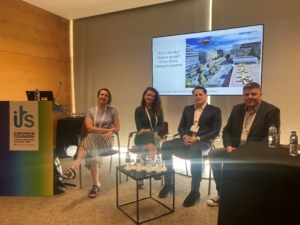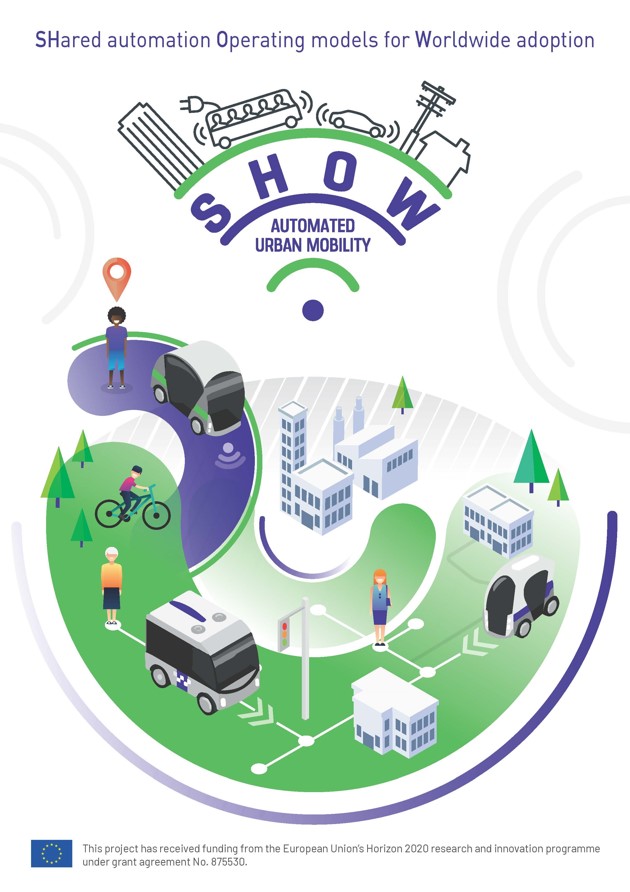The 15th ITS Europe Congress took place in Lisbon from 22 to 24 May 2023. The ITS Europe Congress is dedicated to smart mobility and the digitalisation of transport. The theme this year was ‘The Game Changer’. EPF participated in two sessions, connected to our H2020 projects AURORA (on UAM – Urban Air Mobility) and SHOW (on CCAM – Connected and Cooperative Automated Mobility). Will UAM and CCAM be the Game Changers for the future of our mobility?
ITS in the sky!
 🚀The #ITSLisbon2023 panel discussion on “ITS in the Sky!” took off on 24. May! ⛅🚁 Panelists from AURORA (in which EPF is a partner) and its sibling projects Airmour and Flying Forward, took the stage for a lively and interesting debate on ‘Drones as part of our future transport systems’.
🚀The #ITSLisbon2023 panel discussion on “ITS in the Sky!” took off on 24. May! ⛅🚁 Panelists from AURORA (in which EPF is a partner) and its sibling projects Airmour and Flying Forward, took the stage for a lively and interesting debate on ‘Drones as part of our future transport systems’.
In the coming years, a dramatic increase is expected in drone flights. A new mode of transport for goods and people becomes part of our daily lives and should also become part of daily traffic management practices in cities. Integrating the third dimension – airspace – into legacy traffic management systems is a true paradigm change. Low level air traffic coming to cities brings along a new vocabulary and range of safety requirements and regulations. In parallel, stakeholders – from industry and regulatory bodies – unfamiliar with city practices and traditional ground traffic management need to find their way to the right counterparts in a city. So, the industry is pushing forward but there is a lack of readiness on the local level: how to approach this challenge? What kind of new ITS initiatives could mitigate risks related to safety or economic sustainability?
In this ‘ITS in the sky’ session, Petri Mononen of VTT Technical Research Centre of Finland focused on urban airspace management and roles of cities. What are the intelligent digital services that can help ensure safe and efficient access to airspace for large numbers of drones? What capabilities should be developed and are realistic to demand from a local authority or are for the market? Lisa van der Heijden, representing the Flying Forward 2020 project, spoke about the importance of involving a wide range of essential stakeholders when using Living Labs for drone demonstration and integration. Silvio Semanjski of SEAL Aero in Spain, representing the AURORA project, shed light on technical challenges related to the roll-out of Unmanned Aircraft System Traffic Management. How to safely and securely manage airspace traffic and capacity? What kinds of safety-critical technologies are needed to support (autonomous) drone operations in urban environments?
As we are now entering the final months of our projects – stay tuned to find out more about our research and pilots at our final event, planned around end of November 2023 (sign up for the AURORA newsletter not to miss it!).
Empowering communities through automated mobility education & capacity building
 👥💡EPF was invited to participate in a special session on CCAM 🚗🚌 – Connected, Cooperative and Automated Mobility – organised by PAVE Europe. Other speakers in the panel included Giulia Renzi (ICOOR), Gonzalo Alcaraz (International Road Federation) and Ricardo Fonseca (National Road Safety Authority Portugal).
👥💡EPF was invited to participate in a special session on CCAM 🚗🚌 – Connected, Cooperative and Automated Mobility – organised by PAVE Europe. Other speakers in the panel included Giulia Renzi (ICOOR), Gonzalo Alcaraz (International Road Federation) and Ricardo Fonseca (National Road Safety Authority Portugal).
Cooperative, connected, and automated technology has the potential to revolutionize passenger and goods mobility, but achieving this requires collaboration between all stakeholders. Despite efforts to promote safe and efficient deployment of autonomous mobility, there are still gaps that need to be addressed to move the sector towards autonomous mobility faster. Stakeholders’ cooperation can play a significant role in addressing these gaps and sharing knowledge and experience to benefit the entire community. To address these challenges, this session brought together key organizations and stakeholders from different parts of Europe who are already working on autonomous mobility. The session reported on the strategies developed by transport authorities to facilitate the integration of automated vehicles and shared mobility services into existing transport systems. Additionally, lessons learned from trials and commercial operations, and large-scale projects like SHOW, were shared to promote cooperation, capacity building and education. The session addressed behavioural change as well as the importance of engaging the general public to ensure their understanding and acceptance of the technology.
EPF’s presentation (available here) focused on user acceptance and user benefit – which should go hand in hand. User acceptance as such should never be a goal in itself. We need to avoid a technology push and adopt a user-centric approach – What’s in it for people, and what’s in it for society? -, making sure that we develop new mobility services that answer to people’s real needs and bring added value to their lives.
Follow the SHOW project on social media (LinkedIn, Twitter) or sign up for the project newsletter to stay updated on the latest news from our pilots, including the engagement activities.


 Stay informed!
Stay informed!